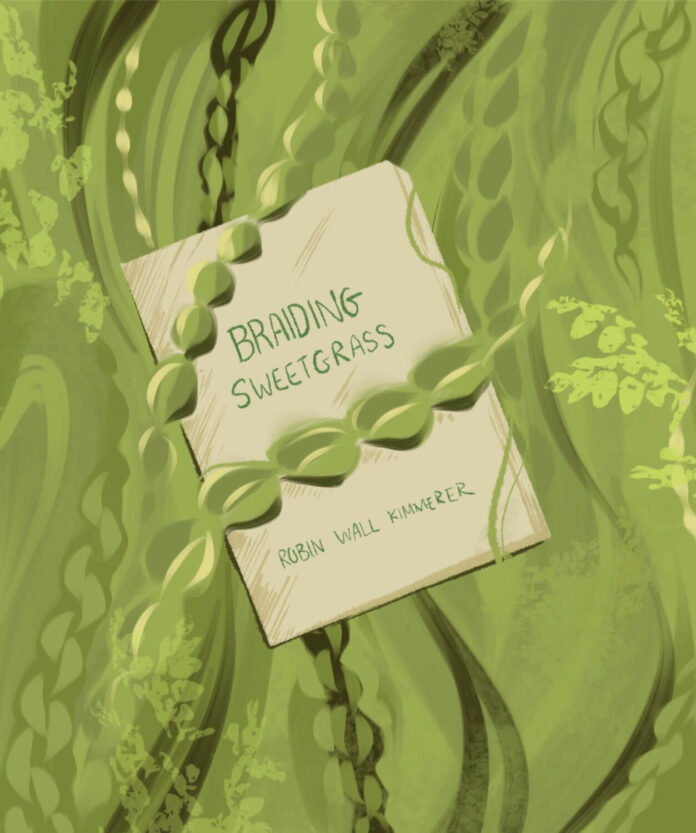Following the final event of the 2023-2024 Community Book Program — the author’s virtual visit to Oxy — I’d like to offer reflections on the book’s significance to me and explore how its themes might resonate within our campus community.
Through mesmerizing prose, Robin Wall Kimmerer presents a written tapestry that weaves indigenous wisdom with Western scientific perspectives, offering a rich and insightful portrayal of the interconnectedness between humanity and nature. The recurring theme of reciprocity — the mutually beneficial practice of willful giving and receiving with others, whether human or non-human — spoke with me.
One of the most important ways Kimmerer illustrates interconnectedness and reciprocity is through symbiotic relationships in the environment. A favorite chapter of mine, titled “The Three Sisters” explores the harmonious dynamics of beans, squash and corn, and their relationship with nature and with humans. Kimmerer explains the scientific rationale of the trio’s interconnected symbiotic growth, highlighting how they thrive when together, as well as when humans care for them since they’re domesticated. Thus, the three plants depend on humans to maintain proper conditions for growth while humans depend on the plants for sustenance. In short, it’s a beautiful lesson of mutual support and interconnected relationships. As a botanist and member of the Citizen Potawatomi Nation, the author primarily focuses on the importance of reciprocity with the environment, but the concept also extends to various facets of life.
Guided by Kimmerer’s insights about the unique gift of written language that humans possess, I see writing as an avenue for reciprocity — a way to engage and express gratitude for what I receive from the world. For me, this reciprocity takes shape through essays, daily journaling, writing to out-of-state friends and family and composing book reviews. On the latter example, I’ve always been an avid reader and I feel deeply grateful to have access to such enriching literature. Through writing about my literary experiences, I can actively participate in the cycle of reciprocity. This process involves giving time to think about the author’s text, crafting a review to share with others, and engaging with the author’s work in written conversation, such as this article. Writing not only strengthens my relationship with literature but also fosters a deeper connection with myself, others, and the world around me, engaging in an intentional relationship through the written word. As college students, being mindful of the reciprocity inherent in writing can enhance our connections within the world.
The theme of interconnectedness can be particularly compelling for Oxy students as we navigate diverse academic disciplines within our liberal arts curriculum. Reminiscent of the “three sisters’ of beans, squash and corn, the idea of interconnectedness takes on a similarly practical and transformative meaning within the context of an interdisciplinary education. Just as the plant trio thrives when cultivated together, our academic pursuits can flourish with interconnectedness in mind. The profound principle reminds and encourages us to bridge the gaps between various fields of study, and between academia and life, overall fostering a more holistic approach. This interconnected worldview challenges us to see the threads that weave through different disciplines, promoting a more nuanced and comprehensive understanding of the complex issues we face.
For example, I took Principles of Economics I last semester and now can’t stop seeing economic concepts at play beyond the Fowler Hall classroom. Friends will get annoyed when I constantly bring up opportunity cost in any given scenario. On a small scale, the economic insight of considering my next best choice in decision-making proves to be very practical for everyday life decisions, from managing my limited social energy to allocating study time across classes. On a larger scale, economics, while important, is just one lens through which to understand the world. Whether exploring cultural anthropology, marine biology, philosophy or foreign languages, I’m able to grasp interwoven fabrics of knowledge.
In an ever-changing, complex world, Kimmerer’s emphasis on interconnectedness serves as a compass, guiding us through the nuanced challenges of our global landscape. Concurrently, her exploration of reciprocity offers a guiding thread, connecting our academic pursuits to an understanding of our holistic existence and a broader purpose of cultivating care.
Kimmerer continuously translates these ideals into action as a professor, mother, and author, which underscores the importance of bridging the gap between academic ideals and behavioral practice. This message holds particular significance for us students as we progress in our academic journeys at Oxy. How can we translate the ideals of reciprocity and interconnectedness into tangible actions within our respective majors, minors and everyday lives? As we reflect on the lessons of “Braiding Sweetgrass,” we find ourselves at the intersection of theory and practice, challenged to close the gap and embody the principles that enrich our academic pursuits.
This year, I’ve enjoyed the opportunity to engage with “Braiding Sweetgrass” through the Community Book Program. The book’s impact has extended beyond its pages — the plant walk and Oxy Arts panel discussion in October were highlights of the communal exploration. Kimmerer’s Q&A session for the Oxy community added another layer to the communal exploration of the book’s themes and reinforced the notion of an education that extends beyond the classroom. The shared experience of delving into this literary journey has not only enriched my academic horizons but has also fostered a sense of community for me, connecting with both peers and professors through the text. Months after finishing the book, in revisiting the ideas of “Braiding Sweetgrass,” I am reminded of the power of literature to ignite curiosity, provoke thoughtful discussions, and inspire action.
Contact Julian Villa at jvilla@oxy.edu
![]()































